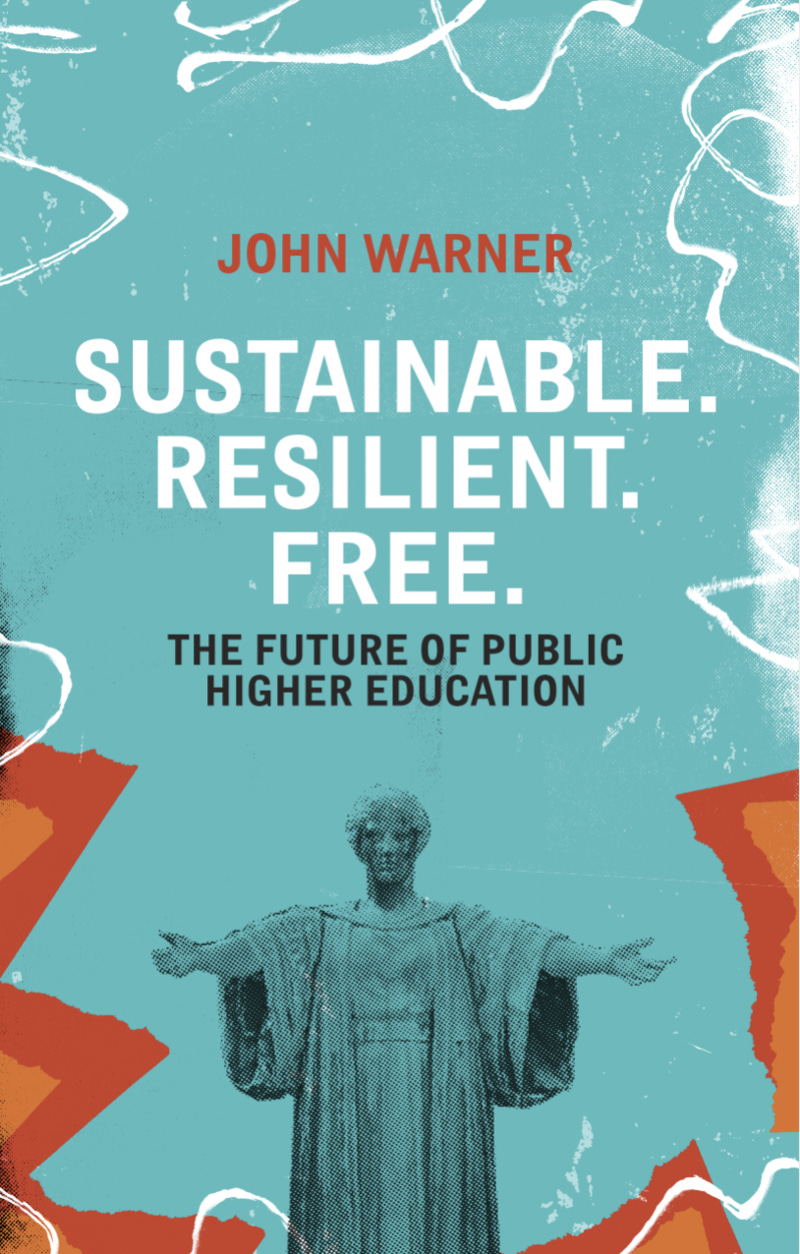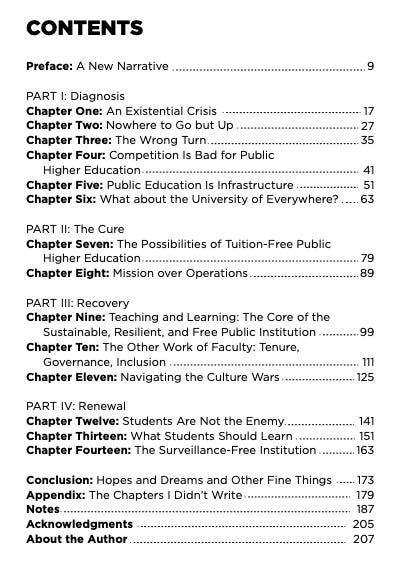This week’s column is about two books on the same subject (student loan debt) that came out on the same day, Indentured Students: How Government Guaranteed Loans Left Generations Drowning in College Debt by Elizabeth Tandy Shermer, and The Debt Trap: How Student Loans Became a National Catastrophe by Josh Mitchell, a reporter from the Wall Street Journal.
The Tribune gives me only 600 words every week, which means I almost always have to leave a lot of thoughts on the editing room floor, but this is a week when I have so much more to say about the issues raised by these two books, that I could fill a book of my own.
Oh wait, I did that already. It’s called Sustainable. Resilient. Free.: The Future of Higher Education and it’s been available from Belt Publishing since last August or so. (I forget exactly when.)
For obvious ethical reasons, I’m not allowed to use my Tribune platform to promote my own books, but for some reason I’ve pretty much carried that prohibition over to this space which is under no such restriction. I think it’s a byproduct of my inherent midwestern nature that we’re not supposed to call too much attention to ourselves lest we get too big for our britches.
As I read the two books, I kept thinking …but but but but what do you think we should do about this mess? - waiting for the authors to connect the dots between our unbelievably messed up system of how we fund higher education and the disaster of student debt, but that’s not the purpose of those books, so I can’t fault them for not doing something they weren’t intended to do.
My book, on the other hand, does attempt to map out the deep structural problems with how post-secondary education is organized, overseen and funded in the U.S. and how these flaws have led to a system which costs much more than it needs to and squanders a lot of what is spent on activities that have little to do with teaching and learning.
Because I declare my position in the opening pages, it’s not a spoiler to say that I am for both cancelling the existing $1.7 trillion dollars in federally held student loan debt and making public post-secondary credentialing tuition-free.
This is when some of you start going …but but but but but - and let me say that I understand, but let me also say that whatever question or objection you might have, I probably attempt to deal with in the book. This isn’t to say that my argument for my position will sway your opinion, but you will likely find something to make you at least consider your own stance again.
Of course it would be awesome if people were interested in reading the whole book, but since that’s probably not going to happen, if you have a question related to the subject of college costs, college majors, student loan debt, online education, whether or not liberal college faculty are trying to brainwash their students, or anything that seems remotely related, put them in the comments and I’ll get to them as quickly as I can.
Here’s the table of contents for the book, which may give some sense of its scope:
The book is informed by my decade-plus of writing about higher education for Inside Higher Ed, as well as the twenty or so years I spent teaching college, a job I only do very occasionally now on a part-time basis because I was never paid more than $35,000 a year to do it, even when I was working full-time. When I do pick up a class know, my wage is $3250 per semester, which is a little less than the national average for adjunct instructors, and depending on the class, works out to around $11 an hour for me once you factor in prep, grading, et al. Non-tenure track instructors are a majority of the faculty in colleges and universities and teach the overwhelming majority of courses.
Putting every last bit of my modesty aside, I was (am) an uncommonly good instructor of writing. The class text I wrote based in my own writing pedagogy, The Writer’s Practice: Building Confidence in Your Nonfiction Writing, is used in classrooms across the country. There is not a student on the planet that I cannot put on a trajectory to improving as a writer if you give me some period of time to work with them.
But I cannot afford to have a job teaching college, so I don’t do it anymore. That reality obviously colors my broader feelings about the system within which our colleges and universities operate, which readers should take into account as they judge my arguments, but I would argue that not just seeing how the sausage is made, but being one of the waste products of that process (Seriously, John? Gross.) has given me a unique perspective on the problem.
Alright, that’s enough horn tooting for the week. If you are interested in the book, I strongly urge to you to buy directly from Belt Publishing. This funnels more money to both the publisher and the author. Plus it’s only $12 right now.
And while you’re there, check out Belt’s summer sale, with some books up to 80% off.
Links
I experimented with a mid-week selection of bookish links. If you missed it, click here.
The Magazine N+1 started a kerfuffle with this piece about the sorry state of current book reviewing. Book critic (and an excellent one) Christian Lorentzen responded. I got some thoughts about all this that I’m keeping to myself for now, but my column on the distinctions between critics, reviewers, and enthusiasts from February covers some of what I might say if I was saying anything.
At Esquire, we get a list of 15 books that will make you want to travel.
The author Kim Stanley Robinson considers novels of utopia in the light of the threat of climate change.
The new books to look out for this week come from LitHub.
I’m always wary when a list calls something the “best,” but there’s no doubt these are all excellent bookstores.
Self-promotion link: At my other totally free newsletter dedicated to education issues I wrote about how terrified I was of becoming Steve Guttenberg.
Reading companion of the week
No reader submissions for the reading companion of the week this week, so a throwback picture of my family dog when I was a kid, Melvin. Not the most handsome creature around, but a real character. This is actually him listening to my father play the piano.
Send pictures of your favorite reading companions to biblioracle@substack.com, and I’ll share them here.
Recommendations
All links to books on these posts go to The Biblioracle Recommends bookshop at Bookshop.org. Affiliate income for purchases through the bookshop goes to Open Books in Chicago. Excellent steady progress on affiliate income, up to $130.25.
If you’d like to see every book I’ve recommended in this space this year, check out my list of 2021 Recommendations at the Bookshop.org bookshop.
As always, recommendations are open for business, and the supply is low, so wait times are minimal.
1. Since We Fell by Dennis Lehane
2. World Travel: An Irreverent Guide by Laurie Woolever and Anthony Bourdain
3. Anxious People by Fredrik Backman
4. The Premonition: A Pandemic Story by Michael Lewis
5. The Plot by Jean Hanff Korelitz
Rod R. - Lake Bluff, IL
I can tell from this list that Rod likes a good twisty story and I just finished a great one that had me guessing throughout, Who Is Maud Dixon? by Alexandra Andrews.
Have a grand week, everyone!
John
The Biblioracle






